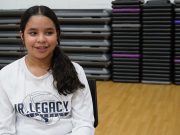Lizbeth Uzcategui was born without a right arm below the elbow and only three fingers on her left hand, but that did not stop her from lending a hand to people just like her.
She knows the challenges that come with living life as an amputee, but those challenges only made her a better guide for the people she helps get used to that life.
“Losing a limb is a life-changing event,” Uzcategui said. “People are going to want to know what to expect, and it goes beyond just the person affected.”
Uzcategui, 50, is the regional coordinator of AMPOWER, a national program that helps recent amputees adjust to life without their limbs, both emotionally and physically.
She was born with amniotic band syndrome, a rare congenital disorder in which strands of tissue from the amnionic sac injure a fetus in the womb, and has worn several prosthetics on her right arm since she was 3 years old.
Living without a limb can be a struggle, but Uzcategui’s boundless energy never let the hard times keep her down for long.
Growing up in Caracas, Venezuela, she was raised by a family that refused to treat her differently because of her condition.
Her parents and siblings wanted Uzcategui to know that her missing limbs didn’t make her any different from other girls.
She wanted to prove it—both to her family and to herself.
She discovered her love for teaching at 15 while working as a tutor, graduated from the Venezuelan Metropolitan University in 1995 with a bachelor’s degree in modern languages, and in 1996, was the first of her siblings to leave Venezuela for the United States.
“The limitations were really up here,” Uzcategui said as a bionic finger pointed up to her head. “If I was to believe that I was handicapped, then I was going to be handicapped. I didn’t believe that.”
After teaching Spanish in Pennsylvania for several years, she moved to Florida in 2006 and switched gears from language education to patient education.
She currently works with prosthetists as well as patients and their families at Hanger Clinic, a clinic in Hollywood that specializes in prosthetic and orthotic care.
No week is the same at the clinic. On one day, Uzcategui is meeting with a patient at the hospital, and on the next, she’s organizing a seminar on prosthetic care for some of the best healthcare professionals in the field.
On top of her responsibilities at work, she also manages, promotes and participates in events like pickleball, scuba diving and even water skiing with her patients every month to keep them active and healthy.
These events serve as a way for amputees and their families to socialize and build a sense of community, but they also give Uzcategui the chance to learn new things.
“It’s important to remind myself that, even though I’ve lived with limb loss my entire life, some of the activities that the patients want to do are still challenging!” she said. “It’s fun, it’s a win-win for everybody.”
Jesse Mitrani, an experienced prosthetist who works with Uzcategui, says that she is able to accomplish things that he cannot.
Mitrani says that he empathizes with what his patients go through, but at the end of the day, he cannot be in their shoes.
Uzcategui’s work is important, he says, because she is able to understand and connect with amputees, and he has seen her ability to improve people’s lives firsthand.
“She really does care, and she has a lot of energy,” he said. “I think that’s a special quality.”
Helping people like herself means the world to Uzcategui.
She likens herself to a lighthouse that guides people back to the shores of normalcy, showing them that, even though they’ve lost an arm, a leg, or more, there is always hope.
“Yes, it’s terrible that they have to go through that,” she said, “but that’s the importance of reminding them that they are not alone. Other people have done it, and they are going to do it too.”
Uzcategui is always looking for new ways to help people, whether it is informing doctors about the latest prosthetic technology, guiding new amputees through their next steps, or setting up another pulse-pounding activity.
“It’s my life purpose,” she said. “There’s absolutely no doubt about that.

































